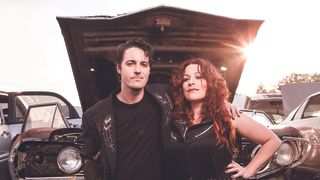Married couple Cary Ann Hearst and Michael Trent, aka Shovels & Rope, have been recording together since 2008, fashioning punky country-blues and gospel from their tiny studio near Charleston, South Carolina. Since scooping up two Americana Music Association gongs in 2013 they’ve had a Billboard Top 20 album and been the subject of an award-winning documentary. Little Seeds, their fifth album, documents “a harrowing couple of years, full of beauty and sorrow”.
Is Little Seeds your most personal album yet?
Cary Ann Hearst: Definitely. We were in the middle of the firestorm that is human existence; your parents are getting older, there’s turmoil everywhere you turn and your babies are coming into the world. Becoming parents is one of the most mind-blowing experiences that human beings can have, so we were feeling things so intensely that we couldn’t avoid writing about them.
Mourning Song and Invisible Man both address the Alzheimer’s disease that Michael’s dad is going through. Was that difficult to write about?
Michael Trent: In its most raw form, Mourning Song was dealing with the fact that my dad is probably going to die from this disease and my mom is going to be alone. It’s strange to think about it in terms of songwriting, because that’s just what we do. It was more like a way to deal with it personally.
- Dan Patlansky: Meet The Rising Star Of The Blues
- The best new blues albums you can buy this month
- Can there be such a thing as ‘real blues’ in the 21st century?
- The Greasy Slicks: raw blues rock from three very sweaty men
This Ride is another song that deals with life’s highs and lows.
CAH: That one was written and recorded for the most part, then our friend was murdered [Eric Brantley was shot in a Charleston parking lot this April] and it just deepened the meaning of the song. It added to the already big pile of emotions and heaviness. Michael bookended This Ride with Eric’s Birthday, where Eric’s mother talks about giving birth to him in a police car.
MT: It was recorded while she was speaking at his memorial. And it’s such a great story. Everybody was laughing through their tears, and that’s what a lot of this record seems to be.
Neither of you are actually from Charleston. What is it about the place that feels so much like home for you?
MT: When I first moved there from Denver in 2004 I was drawn by the fact that it was a cool little music community that felt like a good secret. Some of the greatest songwriters I’ve ever heard are here, but they don’t really care about anything except for playing in the wine bar for friends.
CAH: I went to college there. It’s a complicated place. As a southerner there’s a beautiful, rich history and also a terrible, godforsaken history that live hand in hand. And Charleston is the heart of all of that. I love that conflicted nature of the city and its energy.
Did you have long-term goals when you first got the band together?
CAH: We knew we wanted to play music together for a living and were willing to stay out on the road indefinitely. We had each other and our dog – and what the hell else did we need? So we just kept on going, taking it one album and tour at a time. The next thing you know you’ve been on the road for five years. And you decide that you want to proceed…
MT: …until you’re dead.



